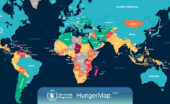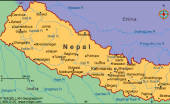Re Ian Bremmer 'Could third-party candidates upend the 2024 US election?' 3 April The current political movement in the USA…
Wednesday Night #1732
Written by Diana Thebaud Nicholson // May 13, 2015 // Wednesday Nights // Comments Off on Wednesday Night #1732
ANOTHER devastating earthquake in Nepal. As Quartz points out “During the earthquake on April 25 not all of the pent-up seismic pressure was released. This left room for more earthquakes in the near future. And then one occurred today, about 18km below the surface and east of Kathmandu. It is not clear yet if this quake has indeed released all the remaining pent-up pressure.” The consensus is that there are more – and even bigger ones- to come. Without in any way demeaning the importance of the devastation to Nepal, other disasters are looming, notably, as Reuters reports, El Nino has emerged, and Asia braces for crop damage. In 2009, the El Nino brought the worst drought in four decades to India. It razed wheat fields in Australia and damaged crops across Asia. Food prices surged. A closely watched forecast by Japan on Tuesday confirmed its return this year.
EU foreign policy chief Federica Mogherini has pleaded for UN help to dismantle criminal groups smuggling migrants into the European Union.[Why don’t they call them refugees, which is what they are? Or is there a legalistic reason for not labeling them as refugees?] According to the BBC’s analysis, “This was a speech aimed at rallying nations outside of the EU to galvanise their wider support in tackling the migrant crisis. It was also an attempt to determine a legal basis for the search-and-destroy operations to be carried out on empty, Libyan, smuggling boats.” Searching and destroying the smugglers’ boats may be good law enforcement, but it is a pitifully inadequate response to the underlying causes.
While the EU considers what to do about the refugees/migrants arriving on the shores of Italy from Libya, in southeast Asia another tragedy is playing out as Thousands Of Bangladeshi And Rohingya Migrants Are Trapped At Sea.
In Inequality, Immigration, and Hypocrisy Kenneth Rogoff – while acknowledging that millions of desperate people who live in war zones and failed states have little choice but to seek asylum in rich countries, whatever the risk – writes “the inequality debate has focused so intensely on domestic inequality that the far larger issue of global inequality has been overshadowed. That is a pity, because there are many ways rich countries can make a difference. They can provide free online medical and education support, more development aid, debt write-downs, market access, and greater contributions to global security. The arrival of desperate boat people on Europe’s shores is a symptom of their failure to do so.”
He also takes a shot at “Thomas Piketty’s Marxian claim that capitalism is failing because domestic inequality is rising has it exactly backwards. When one weights all of the world’s citizens equally, things look very different. In particular, the same forces of globalization that have contributed to stagnant middle-class wages in rich countries have lifted hundreds of millions of people out of poverty elsewhere.”
The results of the UK elections were a (not-always-welcome) surprise to most. We’re nervous about any hope of improved relations with the EU. According to Tuesday’s Guardian “George Osborne arrived in Brussels for today’s Ecofin meeting, and declared that he’s determined to reform the EU for the benefit of Britain, and the rest of Europe too”. He used the opportunity to warn that Britain would be “resolute and firm” in seeking to repatriate powers before a referendum on whether the UK should quit the union. “We come here with a very clear mandate to improve Britain’s relationship with the rest of the EU and to reform the EU,” said Osborne. “I don’t think anyone is now in any doubt that we will hold that referendum on British membership of the European Union having conducted these negotiations. We go into the negotiations aiming to be constructive and engaged but also resolute and firm and no one should underestimate our determination to succeed.” Doesn’t sound too promising.
Perhaps fortunately, the EU finance ministers are principally worried about Greece which seems to have temporarily solved the problem by robbing Peter to pay Paul and tapping reserves in its IMF holding account to pay its IMF loan. Meanwhile, changes to the law have allowed the central government to collect €600m of local government and other public entity money to help it deal with the cash crisis. On Monday, [Finance Minister] Varoufakis warned his country’s financial situation was “terribly urgent” and the crisis could come to a head in a matter of weeks. We hope that Kimon Valaskakis and our other economist friends will propose a more permanent solution. Kimon’s op-ed in The Gazette The myth of the lazy Greek carries a refrain that is familiar to many Wednesday Nighters, but bears repeating.
While absorbing the results of the UK elections, some may have missed the formation of Benjamin Netanyahu’s new coalition government that has cleared the way for Israel’s ultra- Orthodox parties to return to power after two years in opposition. We find it dismaying that the coalition includes the Jewish Home party that advocates annexation of parts of occupied territory Palestinians seek for a state, along with the ultra-Orthodox United Torah Judaism and Shas parties.
Our friend C Uday Bhaskar forwarded his recent opinion piece on Indo-Chinese relations: Engage the Chinese Dragon With The Two Ts
“Prime Minister Narendra Modi will be visiting China for his first substantive bilateral engagement with President Xi Jinping It will be by far his most important foreign policy visit.
From the Indian perspective, while there are many economic-trade-investment and connectivity possibilities that need to be enhanced, two Ts, namely Territorial dispute and Terrorism concerns warrant candid high-level political review if the Modi visit is to be meaningful. Yes, India and China have many areas of mutual benefit ranging from increasing trade and economic cooperation to investment and macro-connectivity projects such as the ambitious Xi led Belt and Road initiative. But all of this will remain stunted and restricted by the glass-ceiling of the strategic and security dissonance represented by the two Ts.”
Two interesting and very personal opinion pieces serve as bookends for Mother’s Day 2015 adding to the wide-spread discussion of equitable partnerships in marriage, more particularly in the raising of families. Although starting from different points, both conclude that, today, the distribution of responsibility often comes down to questions of economics.
Mom: The Designated Worrier, bolstered by studies and opinions from sociologists, argues that ““one of the last things to go is women keeping track of the kind of non-routine details of taking care of children ” and “Evidence from other animals as well as humans makes the case that the female of the species is programmed to do more than the male to help their offspring thrive.”
In the opening paragraphs of The Link Between Work-Life Balance and Income Equality, Stephen Marche paints a none-too-favorable picture of the theses of Anne-Marie Slaughter and Sheryl Sandberg, however he develops a sympathetic argument that “The central conflict of domestic life right now isn’t men versus women or mothers versus fathers; it’s the family against money.”
After the exhilarating (for many of us) results in the Alberta election, the political scene in Canada reaches ever-greater depths. Andrew Coyne underlines a number of points in A telling 24 hours in Stephen Harper’s world, however we would add a few more. The Liberals’ craven (or too-clever-by-half) decision to support Bill C-51 has resulted in the defection of a number of thoughtful long-time supporters. In a gotcha counterpoint Liberal senators are poised to demonstrate their independence from the Liberal Party leadership in the House of Commons, by voting en masse against C-51. The Senate Liberals’ leader, James Cowan, says he hasn’t spoken to Liberal Party Leader Justin Trudeau, but then why would he?
Like many others, we were stunned by the almost unbelievable admission that Liberal Labrador MP Yvonne Jones ‘inadvertently’ missed the roll call on the private member’s bill to create a national dementia strategy. Her vote in favor would have tied the vote and kept the debate alive. So far, not a peep of reprimand out of the Liberal leadership.
On the Conservative balance sheet, we would add the threat to add any advocacy of boycotting of Israel [Boycott, Divest and Sanction (BDS)] to their list of hate crimes. This puts them up against those well-known purveyors of hate, the United Church and the Quakers. Of course, now they are denying it, but the paper and audio trail remains.
Stephen Harper also seems determined to treat Omar Khadr as the greatest threat to Canada since … perhaps the Quakers? The views expressed by The Sunday Talk panel (Jonathan Kay,Tasha Kheiriddin and John Moore) gave a very credible explanation for the change in Canadian attitudes towards Khadr since his first public appearance and reminded us that many attitudes were previously shaped by the interviews with his Mother who was widely viewed by Canadians as the wicked witch of the Islamist world.
And last, but not least: Federal Conservatives won’t take part in traditional debates
The federal Conservative Party says it won’t participate in the traditional leaders’ debates run by a consortium of broadcasters including CBC, CTV and Global and will instead accept up to five independently staged debates in the run-up to the fall federal election. Conservative campaign spokesman Kory Teneycke (formerly of Quebecor and the late and unlamented Sun TV News) said the Tories have already accepted proposals for two new rival debates – one organized by Maclean’s magazine and its owner Rogers, and the other by French-language broadcaster TVA (which, of course, belongs to PKP’s Quebecor empire).
Lysiane Gagnon adds a sensible postscript to last week’s crise over the terrasse at Alexandre Terrasses et fonctionnaires. One more indication that women should run the world (or maybe just most cities).



